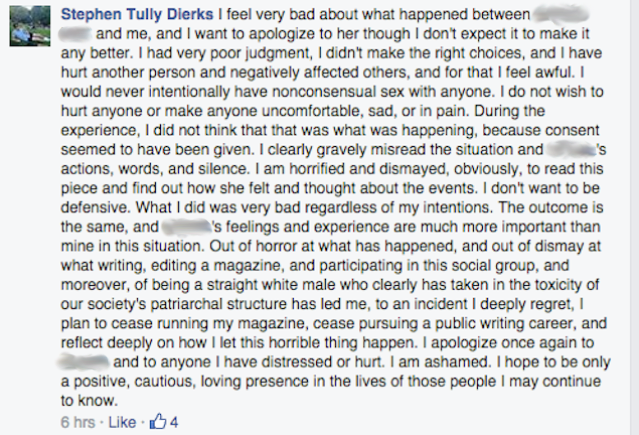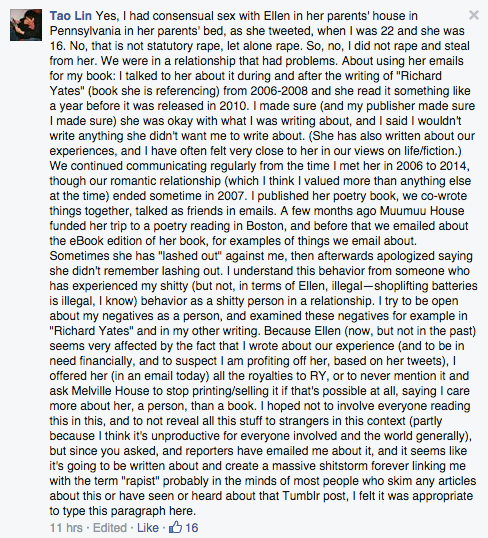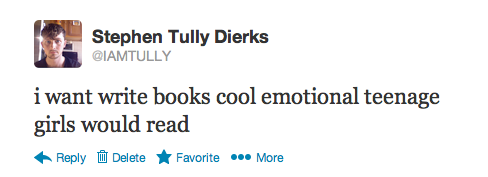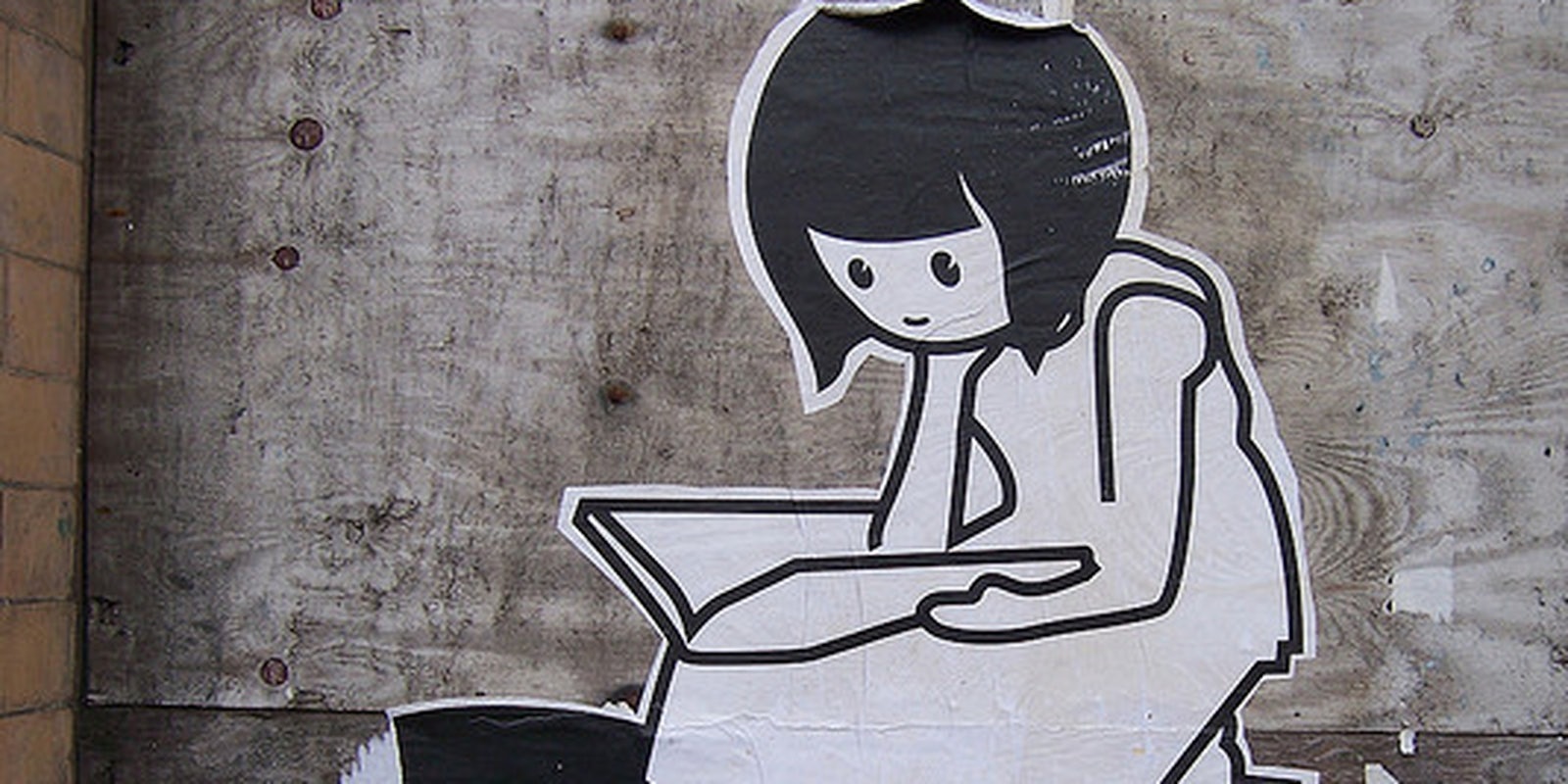The publishing industry is perhaps no more rampantly incestuous than most, with one critical difference: sexual scandal, gossip, abuse, and betrayal among its members will almost always, one way or another, spill out in ink. Usually the digital kind, these days.
This is especially true for the alt lit (or alternative literature) bubble—that hipster millennial sect, tied to Brooklyn but largely manifest online, which prides itself on a deadpan hyper-transparency, a blurring of fiction and bracing fact meant to signal a self-awareness that’s typically in frightfully short supply. Marie Calloway’s “Adrien Brody,” a 2011 essay about an awkward sexual encounter with Rob Horning, the executive editor of the New Inquiry, is a canonical example.
Less well known is “Can I Come Over, in Case I’m Gonna Die or Something,” a 2013 Thought Catalog piece by Stephen Tully Dierks, who edits the alt lit magazine Pop Serial. In it, Dierks briefly describes a college girlfriend who “said she used to sit in a closet and cry thinking about Kurt Cobain killing himself”—or his efforts to turn her into art, anyway:
I tried to write honestly how I felt about her one time and I showed it to a friend who was in grad school, a poet, and he said I was being kind of creepy, that it was creepy how I wrote about her. I didn’t think it was creepy. I guess what I want to do is, I want to write about a relationship as it’s happening and never publish any of it.
That same year, Safy-Hallan Farah wrote a Fanzine essay that called out Dierks and others for exemplifying, according to the editor’s note, “the quiet ways institutionalized racism, sexism, and homophobia operate in the alt lit community.” The article was later redacted to shift its focus away from the individuals named and back to the broader problem—and because someone threatened legal action.
+to his defense. Y’all owe @SafyHallanFarah an apology and/or an expression of gratitude.
— Lauren Traetto (@LaurenTraetto) September 30, 2014
Youll have to google @SafyHallanFarah ‘s name to read it though, bc I had to black out all names after a certain coward sent legal threats
— Lauren Traetto (@LaurenTraetto) September 30, 2014
The specter of a lawsuit is unlikely to insulate Dierks from the new accusations alluded to above: In a now-deleted essay published on Medium, a writer recounted how she was offered a place to stay when visiting New York—and then repeatedly raped—by a publishing figure she gave the pseudonym “Stan.” Shortly afterward, in a Tumblr post, Sarah Jean Alexander identified Stan as Dierks, her former roommate. “I lived with this person for a year,” she wrote. “I listened to the way he spoke about his exgirlfriend after she broke up with him. I listened when he told me he ‘didn’t see the point of hanging out with any of his female friends’ because at the end of the day he doesn’t get to fuck them. …
“We shouldn’t be afraid to discuss this publicly when [the Medium author] has been brave enough to call out her abuser in a community where he has immense support and friendship,” concluded Alexander, who had withdrawn work from Pop Serial over Dierks’ misogyny long before reading the Medium essay. “Stephen Tully Dierks should not be shielded because he is or was our friend. We should hold our friends as accountable as we hold everyone else, if not more.”
With any number of social media channels dedicated to “Alt Lit Gossip,” it wasn’t long before the allegations made the rounds online. Dierks was forced to respond on Facebook in a post that was later deleted, along with his Tumblr and Twitter accounts.

This apology was undercut when two more women came forward. The first took a screenshot of the Medium essay and uploaded it to Instagram with a caption that told a very similar story:
i’ve been so upset since i read this earlier today. so many of my feelings are finally validated. the rapist in this story is a person i have slept with. most of our sex was consensual but tbh not all of it was. i can barely remember the first time we had sex bc i was very drunk, but all of what i do remember fits this story perfectly: i needed a place to crash and was happy to sleep on the floor but he insisted i sleep in his bed, the pressure to have sex even tho other ppl were around, the refusal to wear a condom, the pressure to drink/do drugs. we didn’t have sex sober ever, not even once. is it still rape if you consent sometimes but not always? i feel hurt/confused/sad/stupid. the woman who wrote this is incredibly brave and i have more respect for her than words can convey. you should read it.
According to Tiffany Wines, an 18-year-old college freshman who became the third woman to charge Dierks with rape, this post triggered an epiphany, along with her own Tumblr response. Absent such “bravery and candor,” she wrote, “I might never have found the courage to come forward with my own story and accept the reality of what happened to me.”
Wines’ experience with Dierks, echoing the other anonymous accounts, brought a pattern of abuse into even sharper focus: psychological coercion over physical force, false feminism, and a raging sense of entitlement. The targets were women drawn into Dierks’ circle as fans of alt lit writers or up-and-comers looking to make connections. And the revelation that Dierks had plied the underage Wines with alcohol raised another troubling thought: The women he allegedly preyed on were all quite young.
“Absolutely,” Wines told me in a Gchat when I asked whether Dierks’ apparent fixation on younger women was indicative of a larger problem in the alt lit scene. “There’s a lot of fetishization. I’ve been experiencing it in this community for literally years.” She started befriending members of the scattered clique via poet Steve Roggenbuck, one of Dierks’ frequent collaborators, in October 2012, “a few months shy of my 17th birthday. I completely hid my age outside of a few people I elected to mention it to until my 18th,” she explained.
“Meeting people came along naturally with being a fan,” Wines said. “Often I would find that, when flirted with by older men in the Alt Lit community, when I would disclose my age, instead of backing off, they were aroused by it in a fucked-up way.” (Reading this message, I was reminded that Gawker’s Max Read had recently raised an eyebrow over the rumor that David Shapiro, the alt lit-related author of Pitchfork Reviews Reviews and You’re Not Much Use to Anyone, is dating the precocious fashion blogger-turned-actress Tavi Gevinson: She’s 18 years old, and he’s 26, but he first met and gushed about her when she was just 15.)
“Pedophilia is Alt Lit’s dirty little non-secret,” Wines told me. “It’s the elephant in the room. Until recently people just didn’t talk about it, unless people were brave enough … But those people were ultimately silenced and shut down.” She pointed me to the Twitter feed of E.R., formerly Ellen Kennedy. Now identifying as a trans man, E.R. says that his teenage life was fodder for Richard Yates, a novel by Tao Lin, the man most associated with the alt lit brand. The 2010 book “tracks the rise and fall of an illicit affair between a very young writer and his even younger—in fact, underaged—lover,” and, according to E.R., is straight memoir.
— E.R. (@alonewiththeTV) September 25, 2014
when i was 16 tao lin threatened to break up with me if i weighed over 125 pounds
— E.R. (@alonewiththeTV) September 25, 2014
when i was 16 tao lin accused me of binge eating after i ate 300 calories of plain soybean pasta in one sitting
— E.R. (@alonewiththeTV) September 25, 2014
when i was 16 tao lin fucked me in my parents house, in my parents bed
— E.R. (@alonewiththeTV) September 25, 2014
when i was 16 tao lin made me write out how i failed as a lover everyday through ‘cognitive behavioral therapy’
— E.R. (@alonewiththeTV) September 25, 2014
when i was 16 tao demanded i write a certain amount of writing, emails, and take a certain amount of pictures to him daily
— E.R. (@alonewiththeTV) September 25, 2014
when i was 16 tao lin told me that if i didn’t wear a dress everyday it meant i didn’t like him as much
— E.R. (@alonewiththeTV) September 25, 2014
when i was 16 tao lin drove me in my mother’s car to different stores to shoplift things to sell on ebay so he could pay his rent/bills
— E.R. (@alonewiththeTV) September 25, 2014
when i was 16 tao lin made me feel worthless and suicidal
— E.R. (@alonewiththeTV) September 25, 2014
everyday tao lin continues to profit off of me
— E.R. (@alonewiththeTV) September 25, 2014
tao lin literally copied and pasted my emails into his ‘novel’. he took credit for my words, for my painful memories, for my story.
— E.R. (@alonewiththeTV) September 25, 2014
everyday i see you fucking monkeys support tao lin support the man who raped me and stole from me and feel alienated, excluded
— E.R. (@alonewiththeTV) September 25, 2014
what use to be my greatest escape, writing, instantly became my worst nightmare once tao broke up with me
— E.R. (@alonewiththeTV) September 25, 2014
and now seven years later i still am struggling to find a voice still struggling to see any point in returning
— E.R. (@alonewiththeTV) September 25, 2014
cos you all just think its totally cool that tao lin fucked n belittled me for a year straight when i was only 16 and wrote a book about it
— E.R. (@alonewiththeTV) September 25, 2014
“I’ve been friends with Ellen the past ~7 years,” Lin wrote in an email when asked for comment. “I published her book, talked to her in emails consistently. Then she told me yesterday in an email that she intends to press charges against me for statutory rape.” He has never denied having a consensual sexual relationship when he was 22 and Kennedy 16, though he emphasized that Richard Yates was only published with Kennedy’s approval.
Facing pressure over E.R.’s tweets, Lin refined and expanded on his points in a post on his Facebook wall, saying that he had now offered E.R. all the royalties from Richard Yates and requested that his indie publisher, Melville House, stop printing and/or selling the title.

In a later email, Lin said he was in the process of securing legal counsel, as a friend had informed him that “rape allegations are potentially career-ruining even if they aren’t real.” He painted a shade of gray between himself and Dierks, who declined to speak on the record for this article, arguing that Kennedy had previously defended him against an accusation of statutory rape leveled by her mother. He was filled with “self-loathing” about his emotional abuses but not so much the decision to date a teen who evidently had problems of her own.
i will deal with tao when i can but right now my mental health is more important i just had a bipolar episode a couple of weeks ago
— E.R. (@alonewiththeTV) October 2, 2014
i just needed to get some things of my chest leave the accusations to me this will be solved in due time
— E.R. (@alonewiththeTV) October 2, 2014
Even before E.R. “lashed out” at Lin, readers had flagged paternally sexist trends in his and affiliated writers’ work—which might not be so disturbing were it not for their tendency to present it as entirely sincere and unfiltered. Just last month, in Luna Luna Magazine, Diana Dragonetti took Lin to task for “male projection” in Richard Yates and the way he fetishizes the power that his protagonist has over his young companion, “both in [the] sense of his adulthood and in his control of the narrative.” He also notes that the novel “acknowledges the impossibility of consent” in the relationship, with Kennedy’s character remarking, “You raped me like ten times,” and Lin’s researching the age of consent in New York: 17.
Dragonetti criticizes Roggenbuck, too, for his “‘sad girl’ misogyny,” and laments the sentimentalization of rape culture undertaken—in fiction and conceptual HTMLGiant blog posts alike—by Steven Trull, alias Janey Smith. What complicates these readings further is that the straight males of the alt lit community are educated and theoretically liberal, well-versed in the language of gender equality but able to throw semantic smoke bombs or cry “artistic license” when confronted for their objectifying language—this despite their reputation as the post-irony set. Yet, as Emily Swanson writes on HTMLGiant, Gawker is off the mark to blame Dierks’ behavior on alt lit’s supposed “boys’ club” mentality: Women—including Mira Gonzalez, Gabby Bess, and Melissa Broder—have done more than their share to define and carry the movement. Meanwhile, Dierks can’t truly be said to have occupied a place of special importance or influence within it; many of his prolific and chronically underpaid peers enjoy equal stature.
The reality may be that the Internet itself facilitates these imbalanced relationships between alt lit men and teenage women—it’s a medium that in many ways abolishes the distinctions of age, which assert themselves once more when two people come face to face, the younger then adapting to a submissive role. “It was very easy to continue to be friends with Stephen” following her rape, Wines told me. “I worked hard to convince myself that what had happened was consensual, and so I started to believe it. … He tried to coerce me into having sex with him again about a month later, and I stayed friends with him through that too.” Though she now feels impassioned to speak out, she’s “very disheartened and numb at the same time.”
Beyond this fatalist dynamic, alt lit writers have been known to romanticize the raw, roiling, and somehow purer emotions of pubescence: One recalls the succession of young women kept by J.D. Salinger over the course of his long New Hampshire hibernation, thrown out into the cold when they no longer met his ideal of vulnerable innocence. One of Dierks’ own deleted tweets belies a desire to exploit or ensnare young women going through life’s trickiest transition.

At this moment, women “are feeling emboldened and encouraged to speak out about their experiences, at great risk,” Amy King, who sits on the executive board of VIDA, an organization that fosters “further transparency around gender equality issues in contemporary literary culture,” told the Daily Dot in an email. “Like women who have done so before them, they must brace for detractors, naysayers and be ready to defend against the mere act of speaking out, before we even get to the details of their experiences. Numbers, however, speak louder than the details right now.” This isn’t just an alt lit problem, she added:
The idea of fetishizing girls is not new. Female writers have long been pushed to embody and enact such ideas, whether through coercion or outright abuse, which comes as no surprise nor is this push limited to the Alt-Lit community. Coercion within any writerly community gains traction when men in positions of perceived power: editors, publishers or writers of some note insist on positioning female writers on the spectrum of objectification to infantilization for a variety of so-called rewards—tokenizing through publication enters and gives way to harsher cases of dogged physical insistence that includes assault, as in the case of Steven Tully Dierks, for the sake of simply not making waves or risking being sidelined or even excluded from the community. It seems a clarion of sorts is being sounded in response to the lip-service that Alt-Lit is a special, all inclusive community for young writers, but at what cost. The cost is male business-as-usual, cloaked in a gloss of presumed equal footing for all, but without the actualization of said opportunities.
King sees the opportunity for change, however: a number of men “are not only shouting down naysayers, they are calling for all men to listen to women, without defense, and to stop the usual circling of the wagons.” She quoted author Mike Young, who had just written “a Facebook call to male feminists for that very purpose.” Originally a private response to the allegations against Dierks, with whom Young is personally but problematically acquainted, the essay gained traction, prompting Young to make it public. It addresses the vortex of privilege and complacency in which personhood can be lost, with Young acknowledging that “more important waxing is for me to listen and think.”
Sound advice, though for men more disposed to advance their own views than assimilate any others, it may prove easier said than done.
Update 3:37pm CT, Oct. 2: Editor Lauren Traetto has posted screenshots of an alleged conversation between Dierks and an ex-girlfriend, reportedly with said ex-girlfriend’s permission, in which Dierks contemplates his future should anyone press formal charges. Embedded below is one part of a 12-part series.
Stephen Tully Dierks’ messages to former gf after accusations of rape. Posted with her permission. (7/12) pic.twitter.com/azFjwdO8jl
— Lauren Traetto (@LaurenTraetto) October 2, 2014
Update 10:47am CT, July 24, 2018: This article has been updated to remove the identity of the Medium essayist, after she voluntarily deleted that piece.
Correction: An earlier version of this article named Lisa Marie Basile as the author of the Luna Luna piece, which was actually written by Diana Dragonetti; the editor’s note is Basile’s. Mike Young’s quote has been edited to reflect that it’s drawn from the context of a much longer comment.
Photo by Tom Martin/Flickr (CC BY 2.0)


